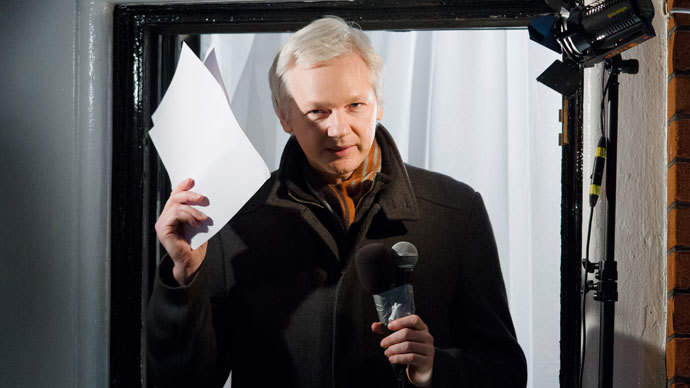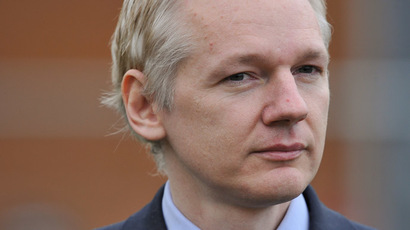Assange requests investigation into US actions against WikiLeaks

WikiLeaks founder Julian Assange submitted a complaint to the Swedish police, seeking an probe into reports of US’ illegal activity in the EU against WikiLeaks, including seizure of his personal property allegedly containing evidence of a US war crime.
In the
48-page affidavit Assange describes evidence of US
military intelligence investigations directed at WikiLeaks and
himself dating back to 2009 and up to the most recent FBI
searches in 2012-2013.
“The subject of this affidavit concerns two events involving Sweden and Germany. These events occur within the context of publicly reported FBI activities against WikiLeaks in the UK, Denmark and Iceland from 2009 to the present, which concern my work,” Assange writes in the affidavit.
The WikiLeaks founder touches on two “previously unreported events”. The first reveals Assange’s “physical surveillance by US military intelligence … in Berlin held on 26-30 December 2009.” The results of which were used “to convict Bradley Manning of 'Wanton Publication’”.
And the second incident concerns the “illegal seizure” of Assange’s suitcase on September 27 2010, while he was on a direct flight within the “Schengen border-free area from Stockholm Arlanda to Berlin Tegel” airports.
The suitcase contained three laptops that had “WikiLeaks material, associated data and privileged communications” on them.
Part of that material included “shocking evidence of a serious war crime; the massacre of more than sixty women and children by US military forces in Garani, Afghanistan.”
Evidence of this US military operation had been “corroborated by testimony in the Bradley Manning hearing.”
“The suspected seizure or theft occurred at a time of intense attempts by the US to stop WikiLeaks' publications of 2010,” the affidavit states.
The WikiLeaks founder received no subsequent information about
the whereabouts of his seized items or the reasons for their
disappearance.

Assange’s
complaint also reveals that he learnt “through an intelligence
source” that on 19 August 2010, the Swedish Security Service
(SÄPO) “requested information about me from an Australian
intelligence organization.” And Australia “responded to
the request with information about me on 21 August
2010.”
Assange explains that his affidavit might also help Chelsea Manning, formerly known as Bradley Manning, in her appeal after being sentenced to 35 years for leaking classified documents.
“If the US military's surveillance of me in Germany was unlawful, then its use in Bradley Manning's trial may have also been unlawful and that such a use of illegally obtained evidence could have consequences for Bradley Manning's pending appeal to the US Army Court of Criminal Appeal.”
‘US intends to imprison me’
WikiLeaks founder learnt from Manning’s court proceedings that “US administration has every intention of imprisoning me and other WikiLeaks associates as co-conspirators.”
Assange’s lawyers submitted the affidavit with Swedish police to seek an “effective remedy” against illegal activities.
“I am informed by my legal advisors that this formal document may trigger an investigation and that independent judicial bodies may seek explanations of the responsible authorities as a result … I request that Swedish judicial authorities act swiftly to question and arrest if necessary those who are likely to have information about or bear criminal responsibility for the actions taken against WikiLeaks and my person as detailed in this affidavit.”
Reportedly, Assange intends to launch similar complaints with the authorities in Germany and Australia.
Since June 2012, Assange has been holed up in a room five meters wide, in London's Ecuadorian Embassy.
This Monday, he marked 1,000 days of confinement, mostly spent under house arrest.
Assange has said he is sure that the minute he sets foot outside the embassy, he would be arrested and handed over to Sweden, where he is wanted on sexual assault charges. He believes he would then be extradited to the US, where he would most likely face trial and a possible death sentence for releasing thousands of classified US diplomatic documents, including about the wars in Iraq and Afghanistan.
Since November 2010, Assange has been subject to a European-wide arrest warrant in response to a Swedish police request for questioning in relation to a sexual misconduct investigation. Assange has denied any wrongdoing and called the charges politically motivated.
The whistleblower fled to the UK where he was taken into custody after voluntarily attending a police station. After spending 10 days in Wandsworth prison, Assange was freed on bail with a residence requirement at Ellingham Hall in Norfolk, England.
In February 2011, a court ruled to extradite the whistleblower to Sweden, with Assange’s lawyers appealing against the verdict to various British judicial authorities.
After the British Supreme Court upheld the extradition warrant, the WikiLeaks founder sought asylum in the Ecuadorian Embassy in London.
He has previously expressed his willingness to answer questions from Swedish investigators on condition that he receives strong guarantees that he won’t be extradited to the United States. No guarantees have ever been given, however.
On July 25, Assange declared he was running in the elections for the Australian Senate and launched the Australian WikiLeaks Party.














